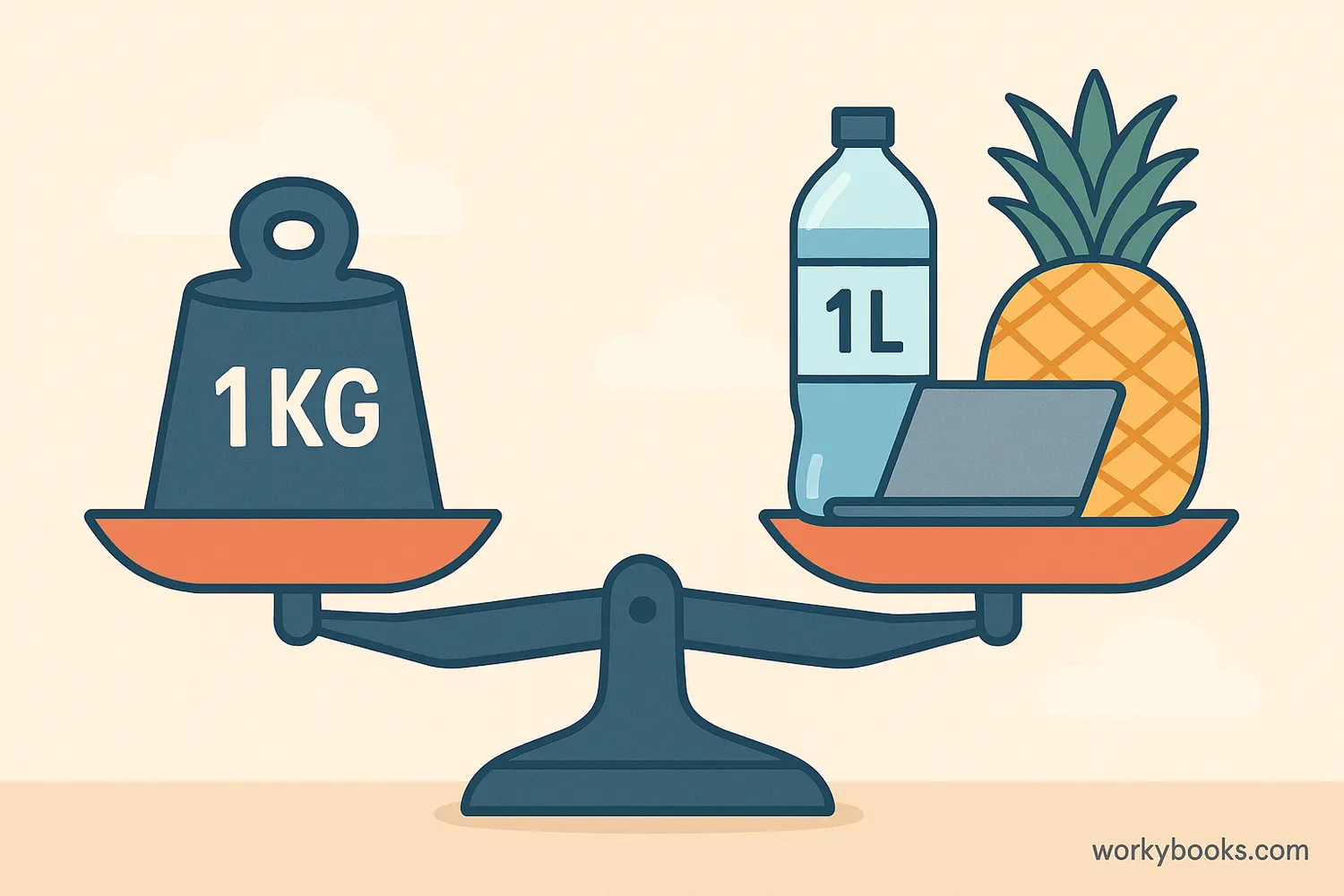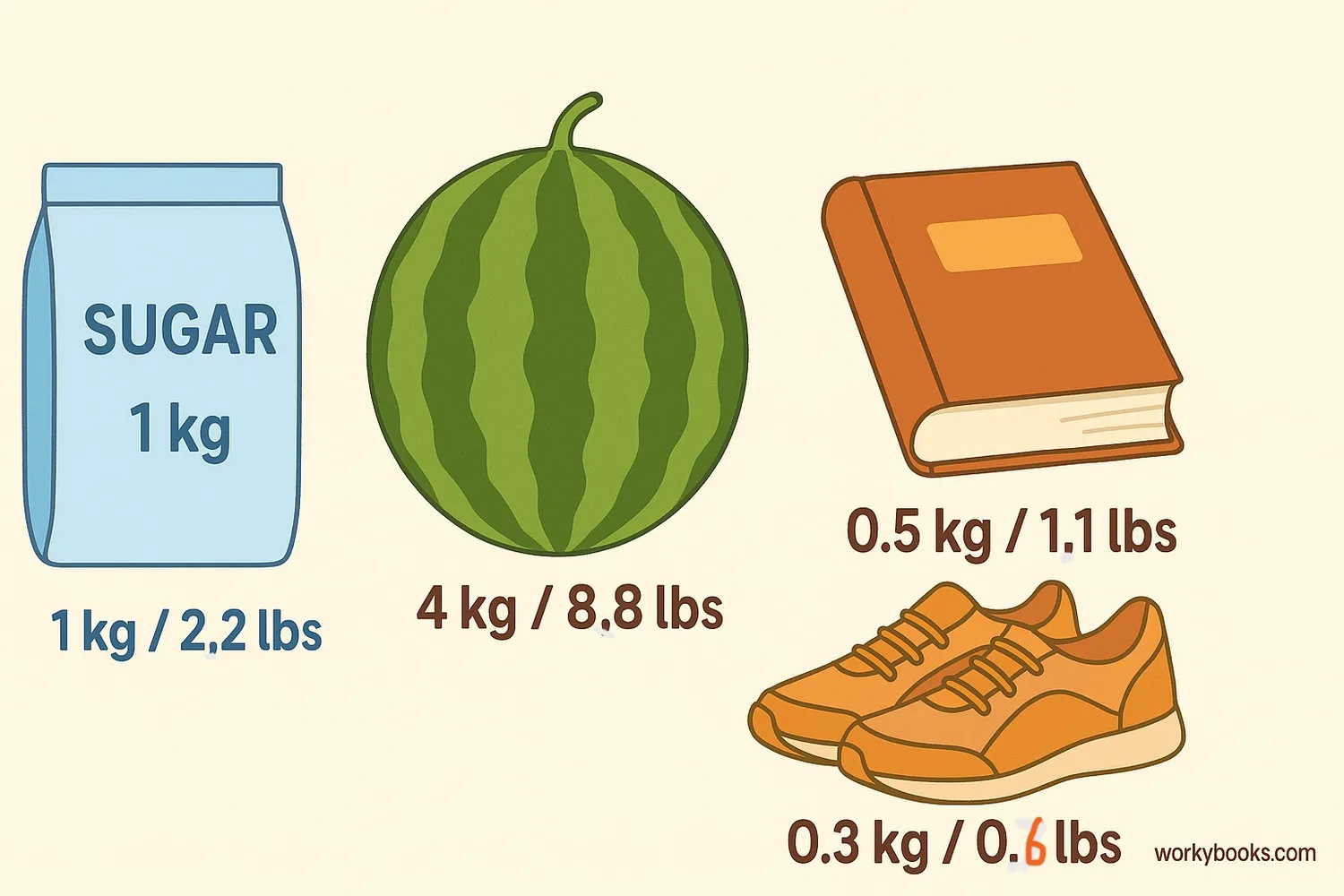Kilogram (kg) - Definition, Examples, Quiz, FAQ, Trivia
Learn about mass measurement with kilograms, conversion to pounds, and practice with examples and activities
What is a Kilogram?

A kilogram (kg) is the base unit of mass in the metric system. It is used to measure how much matter is in an object. The word "kilo" means one thousand, so one kilogram equals one thousand grams.
The kilogram was originally defined as the mass of one liter of water at its freezing point. Today, it's defined by a physical object called the International Prototype of the Kilogram, a platinum-iridium cylinder kept in France.
Kilograms are used worldwide to measure everything from body weight to groceries to scientific measurements. Understanding kilograms helps us compare and measure objects accurately.
Key Concept
1 kilogram = 1000 grams. This relationship helps us convert between different metric mass units.
Kilogram to Pound Conversion
Since different countries use different measurement systems, it's helpful to know how to convert between kilograms and pounds. The conversion factor is:
Conversion Formula
To convert kilograms to pounds, multiply the number of kilograms by 2.2 (approximately).
Example: Convert 5 kilograms to pounds
Step 1: Start with the measurement in kilograms → 5 kg
Step 2: Multiply by 2.2 → 5 × 2.2
Step 3: Calculate the result → 11 pounds
So 5 kilograms equals approximately 11 pounds. To convert pounds to kilograms, you would divide by 2.2 instead.
Remember
When converting kilograms to pounds, your answer will be a larger number because pounds are smaller units than kilograms.
Mass vs Weight
Many people use "mass" and "weight" interchangeably, but they are different scientific concepts:
Mass is the amount of matter in an object. It is measured in kilograms and does not change, no matter where the object is located.
Weight is the force of gravity acting on an object's mass. It is measured in newtons (or pounds) and can change depending on the gravitational pull. For example, you would weigh less on the Moon than on Earth, but your mass would be the same.
Kilograms measure mass, while pounds can measure either mass or weight depending on the context. In everyday language, when we say something weighs 5 kilograms, we're actually referring to its mass.
Key Difference
Mass is constant (measured in kg), while weight changes with gravity (measured in newtons or pounds).
Kilogram to Pound Conversion Charts
Conversion charts help us quickly find equivalent measurements without calculating each time. Here are two useful charts for converting kilograms to pounds:
Kilograms to Pounds Conversion Chart
| Kilograms (kg) | Pounds (lbs) |
|---|---|
| 1 kg | 2.2 lbs |
| 2 kg | 4.4 lbs |
| 5 kg | 11.0 lbs |
| 10 kg | 22.0 lbs |
| 15 kg | 33.1 lbs |
| 20 kg | 44.1 lbs |
| 25 kg | 55.1 lbs |
| 50 kg | 110.2 lbs |
Pounds to Kilograms Conversion Chart
| Pounds (lbs) | Kilograms (kg) |
|---|---|
| 5 lbs | 2.3 kg |
| 10 lbs | 4.5 kg |
| 20 lbs | 9.1 kg |
| 50 lbs | 22.7 kg |
| 100 lbs | 45.4 kg |
| 150 lbs | 68.0 kg |
| 200 lbs | 90.7 kg |
Chart Tip
Notice how each additional kilogram adds about 2.2 pounds? You can use this pattern to estimate conversions!
Real-World Examples

Let's practice conversion with some real-world examples:
Example 1: A bag of flour weighs 2 kilograms. How many pounds is this?
Solution: 2 × 2.2 = 4.4 pounds
Example 2: A newborn baby weighs 7.5 pounds. Convert this weight to kilograms.
Solution: 7.5 ÷ 2.2 ≈ 3.4 kilograms
Example 3: A textbook has a mass of 1.5 kilograms. What is this mass in pounds?
Solution: 1.5 × 2.2 = 3.3 pounds
Example 4: A dog weighs 40 pounds. How many kilograms is this?
Solution: 40 ÷ 2.2 ≈ 18.2 kilograms
Practice converting measurements you see around you - your body weight, packages at the store, or ingredients in recipes!
Conversion Tip
To quickly estimate kilograms to pounds, double the number and add 10% (2kg × 2 = 4, + 0.4 = 4.4lbs).
Measurement Practice Quiz
Test your knowledge about kilograms with this 5-question quiz. Choose the correct answer for each question.
Frequently Asked Questions
Here are answers to common questions about kilograms:
Measurement Trivia
Discover interesting facts about measurement and kilograms:
Origin of the Kilogram
The kilogram was first introduced during the French Revolution in 1795 as part of the new metric system. It was originally defined as the mass of one liter of water at the melting point of ice.
The International Prototype
For over 130 years, the kilogram was defined by a physical platinum-iridium cylinder called the International Prototype of the Kilogram, kept in a vault near Paris. It was replaced in 2019 with a definition based on fundamental constants.
Kilograms in Space
Astronauts use kilograms for measurements in space, not pounds. Since weight depends on gravity but mass doesn't, kilograms provide consistent measurements whether on Earth, the Moon, or in orbit.
Heaviest Animal
The blue whale is the heaviest animal ever known, with specimens weighing up to 190,000 kilograms (419,000 pounds). That's about as much as 33 elephants!





